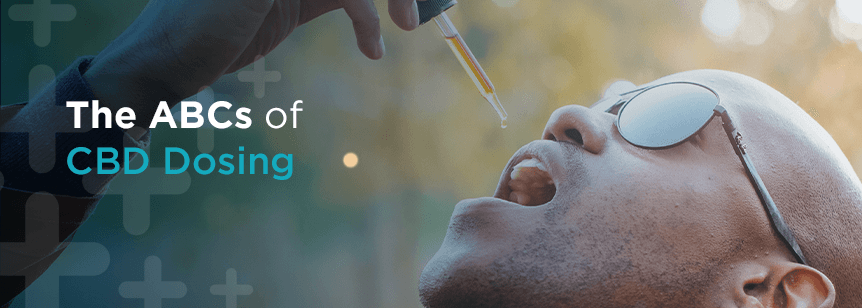
You’re interested in the therapeutic possibilities of CBD, and now hemp-derived CBD is legal in the United States. Unfortunately, it’s not always easy to figure out how much CBD you should take.
Here’s what you need to know to get started with CBD.
The most accurate way to determine CBD dosages is milligrams (mg). This will allow you to calculate and monitor how CBD affects your symptoms, as well as how to increase and decrease future doses.
Most droppers hold 1 milliliter (ml) of liquid, which means, as this post at CBD Origin explains, you can use an equation to figure out how many milligrams of CBD are in each dropper:
[Total CBD mg in bottle] ÷ [Total milliliters in bottle] = mgs of CBD in a dropper
For example, if you have a bottle that contains 1,000 mg of CBD, and it’s a 30 ml bottle, you get:
[1,000 mg] ÷ [30 ml] = 33.3 mg per dropper
This won’t be a perfect measurement, but it will give you a solid estimate to work with.
Look at the serving size and amount per serving on the bottle. For example:
Serving size: 5 drops
Amount per serving: 10 mg
It’s easy math to figure out how many mgs are in each drop:
[CBD per serving: 10 mg] ÷ [Drops per serving: 5 drops] = 2 mg per drop
Once you have that, you can figure out how many drops will get you to your target dose. Let’s say your target dose is 15 mg.
[Your target dose: 15 mg] ÷ [2 mg per drop] = 7.5 drops
Round this up to 8 drops to make it even.
If you’re using a vape
You’ll use the same equation above with a vape, estimating how many mgs of CBD are in a dropper before loading it into your vape. Then, monitor how many times you have to refill your vape each day in order to estimate whether you’re getting the correct dose.
CBD capsules, edibles, beverages, gummies, applicators and other pre-measured servings give you the most accurate way of dosing with CBD. However, some of these methods enter more readily into the bloodstream than others, which is referred to as their bioavailability.
The way you consume CBD can drastically affect how much CBD actually enters your system. A 1983 study put oral bioavailability (think eating, drinking, and capsules) somewhere around 10-20%. In other words, if you took 100 mg of CBD, between 10 mg and 20 mg will actually enter your bloodstream.
Meanwhile, in a 2010 study on guinea pigs and rats, CBD sprayed in the nose had a 34-46% bioavailability after 10 minutes—significantly more. Tinctures applied under the tongue seem to provide about 13-19%. Patches and creams applied to the skin have also shown to be effective for targeted pain, although exactly how much CBD is in the body has been harder to quantify. Instead, follow the directions on the packaging for topical applications.
All of this is to say, if you’ve been taking CBD capsules and then switch to vaping, it may be worth lowering your dose at the start — fewer milligrams could provide the same benefit.
Okay, but how do you figure out what your recommended dose is?
Most experts recommend starting at about 1-6 mg per 10 pounds of body weight. For example, a 180-pound person would start with 18 mg of CBD.
But again, the research is out on this. One of the few prescription CBD medications, Epidiolex, is prescribed at 2.5mg per kg of body weight, twice a day, for epilepsy. That’s roughly 4.5 mg per 10 pounds twice a day.
Different medical issues may call for different dose rates of CBD, but right now, there aren’t clear enough studies to give specific recommendations. For example, studies in rats suggest a dose somewhere between 10 mg/kg and 100 mg/kg could be helpful. As mentioned before, prescription dosing for epilepsy is on the higher end of the 1-6 mg per pound of body weight spectrum.
So while science shakes out what the most therapeutic doses are, you’ll likely have to do some experimenting on your own.
While you’re at it, make sure you’re choosing a high-quality CBD product. Look for organic brands that provide a certificate of analysis (COA) tested by third-party labs to ensure you’re actually getting the CBD concentration that you’re paying for. We have a list of reputable brands here to get you started.
Colleen Stinchcombe is a wellness journalist who has written for SELF, Woman’s Day, Shape, and many others.
No Information on MarijuanaDoctors.Com should be used to diagnose, treat, prevent or cure any disease or condition. You can view our Full Disclaimer here.